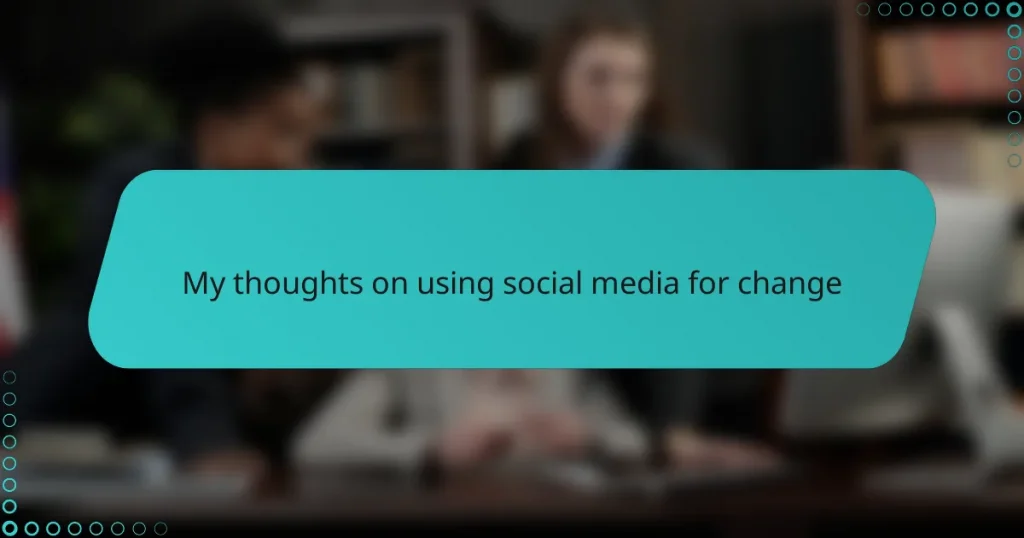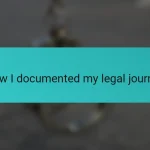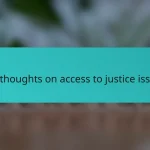Key takeaways
- Legal advocacy combines knowledge of the law with activism to promote fairness and navigate complex systems.
- Social media amplifies advocacy by connecting voices, mobilizing support quickly, and breaking traditional barriers.
- Effective strategies for online advocacy include clear messaging, consistency in engagement, and personal storytelling to foster connections.
- Challenges in social media advocacy include misinformation, backlash, and the risk of burnout, necessitating a balance between passion and self-care.
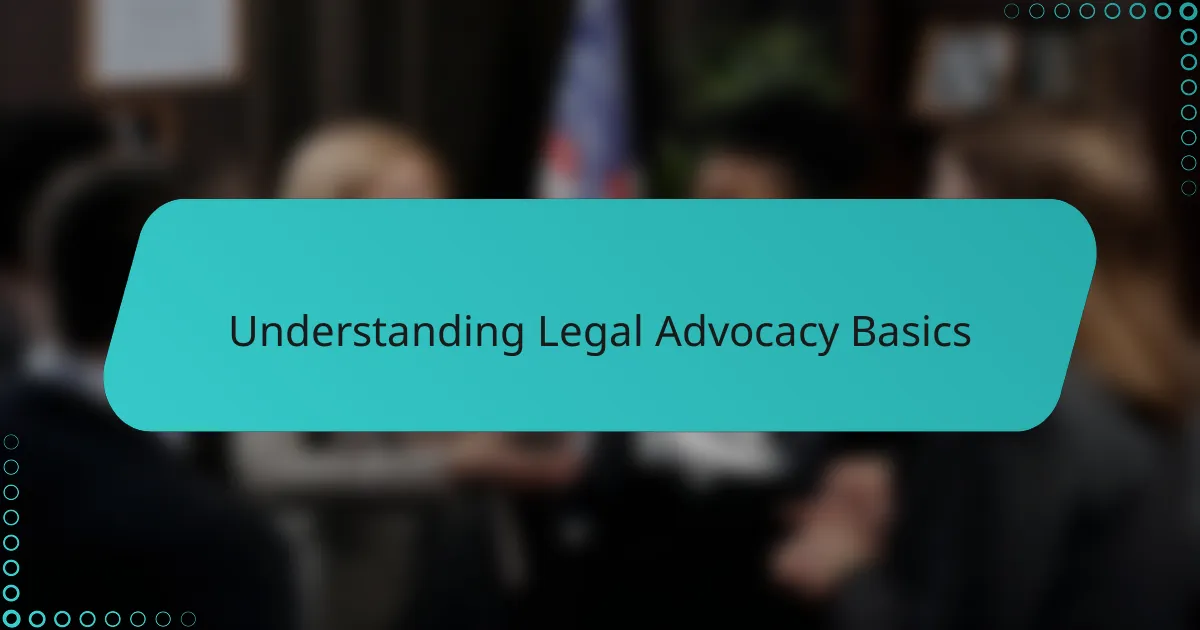
Understanding legal advocacy basics
Legal advocacy, as I see it, is about more than just knowing the law; it’s about using that knowledge to stand up for people who need a voice. Have you ever felt frustrated by a system that seems stacked against you? That’s exactly why legal advocates work—to navigate the complexities and push for fairness where it’s often lacking.
In my experience, understanding legal advocacy means grasping how legal tools can effect real change. It’s not always about courtrooms or lawsuits; sometimes it’s about influencing policies or raising awareness. What’s fascinating is how this blend of law and activism can turn small efforts into significant victories.
Sometimes, I reflect on how legal advocacy requires patience and persistence. It’s emotional work because it challenges injustice head-on, and that can be draining. Yet, knowing that these efforts can improve lives fuels my commitment to this cause every day. Have you ever wondered what role you might play in this process?
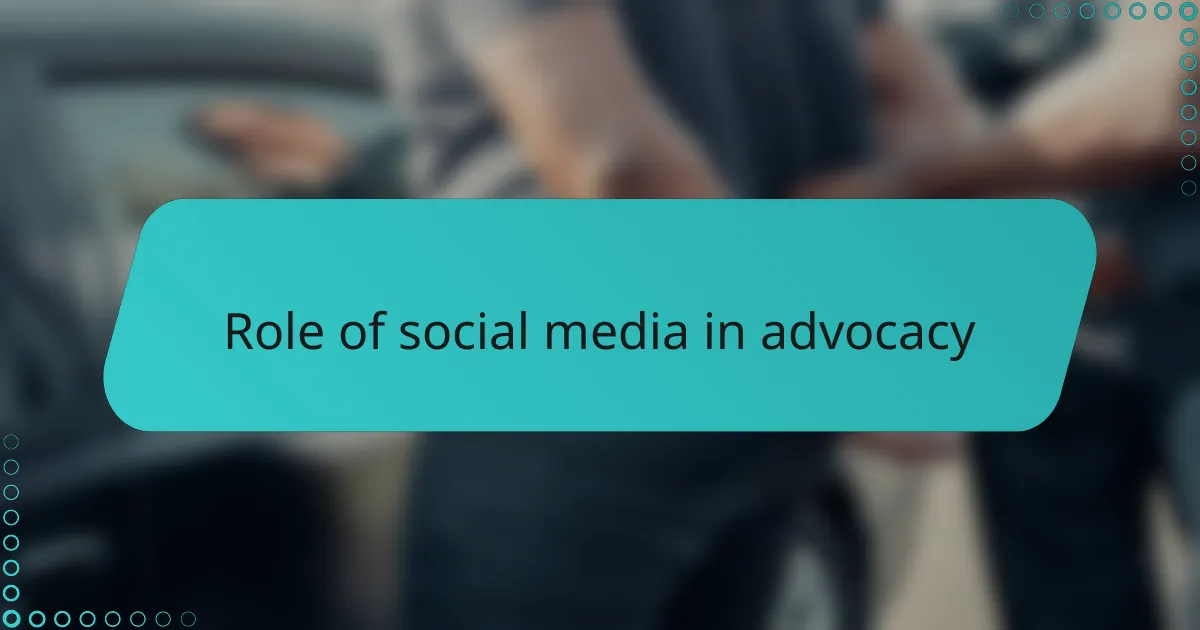
Role of social media in advocacy
Social media, in my experience, has transformed the way we approach advocacy. It’s not just a tool for sharing opinions—it’s a powerful platform to mobilize support quickly, amplify marginalized voices, and hold those in power accountable. Have you noticed how a single post can spark a movement or bring urgent attention to legal injustices?
What strikes me most is how social media breaks traditional barriers. People who once felt isolated or unheard can now connect, share stories, and organize actions from anywhere. I remember times when a hashtag or viral video opened doors to conversations that seemed impossible before. This immediacy and reach make advocacy more inclusive and dynamic.
Yet, I also recognize that social media requires careful navigation. It’s easy to get lost in noise or face backlash, so maintaining focus and authenticity is crucial. Do you think sharing your truth online can make a difference? From what I’ve seen, when advocacy is rooted in genuine stories and clear goals, social media can be an indispensable ally in the fight for justice.
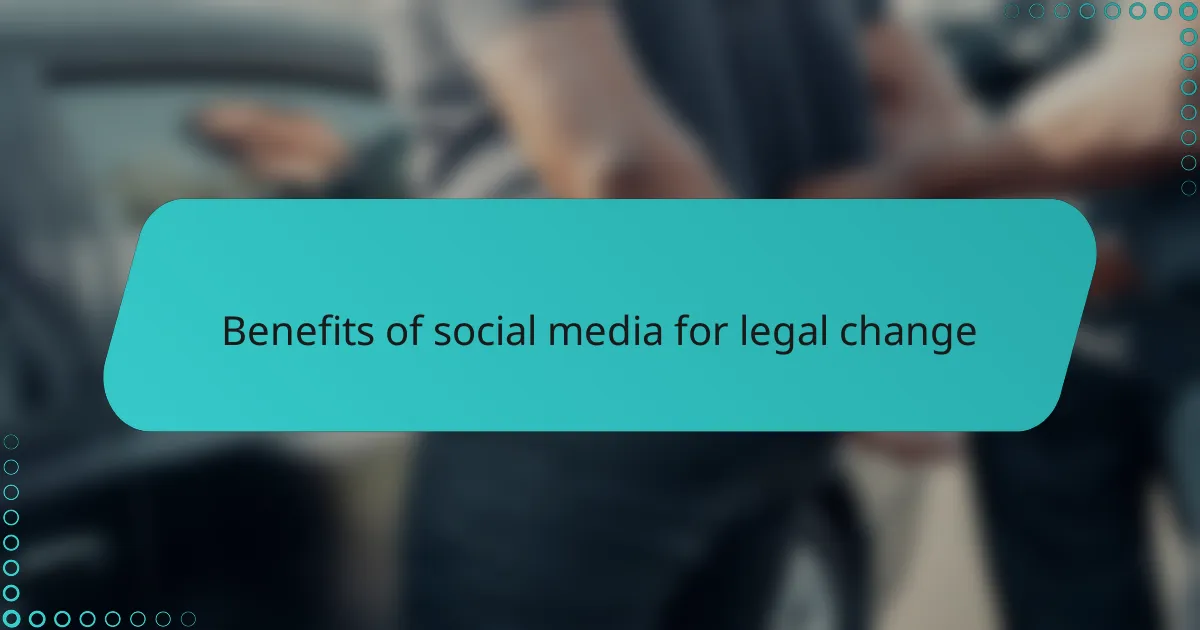
Benefits of social media for legal change
What I find most powerful about social media is its ability to amplify legal issues beyond courtrooms and official channels. Have you ever considered how a simple tweet or post can gather thousands of supporters overnight? From my experience, this instant amplification makes it possible to shine a spotlight on injustices that might otherwise remain hidden.
Another benefit I’ve witnessed is how social media fosters a sense of community among advocates. When you’re facing a legal battle or pushing for policy change, knowing that others are behind you—even from miles away—can be incredibly motivating. I recall campaigns where online solidarity translated into real-world pressure, showing me how connected voices breed real impact.
I also appreciate how social media can democratize advocacy. It’s not just for lawyers or experts; anyone with a story or concern can participate. Have you noticed how platforms can level the playing field, giving marginalized voices a chance to be heard? This accessibility is, in my view, one of the most hopeful aspects of using social media for legal change.
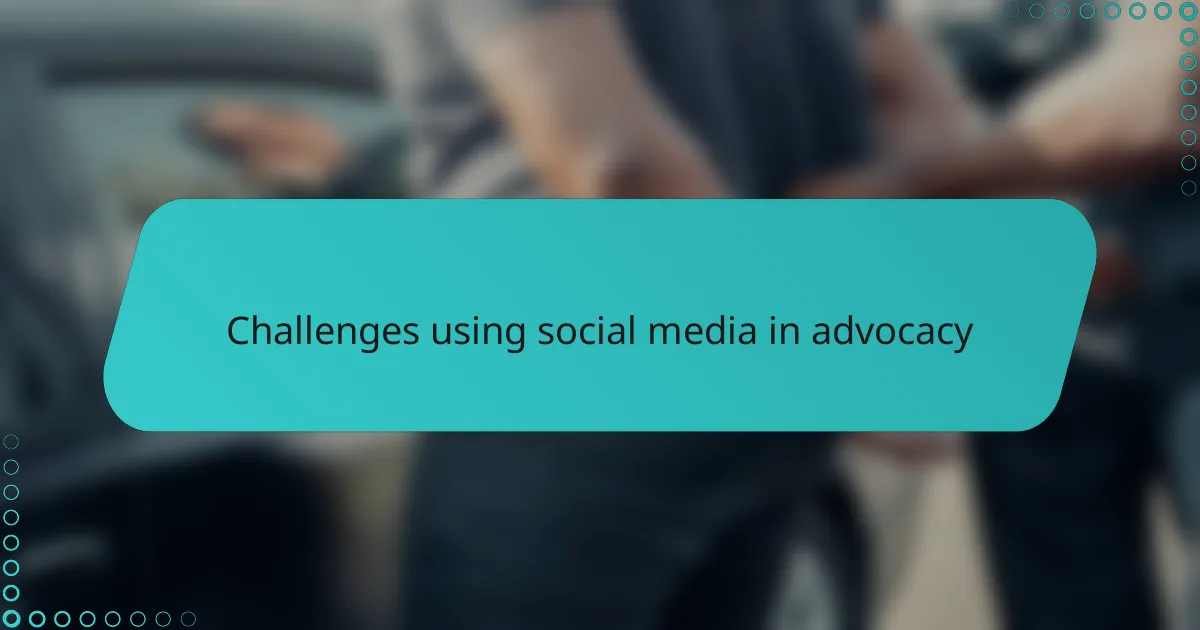
Challenges using social media in advocacy
Social media in advocacy can feel like walking a tightrope. I’ve seen powerful messages get diluted amid the constant flood of content, making it tough to sustain attention on critical legal issues. Have you ever posted something important and wondered if it truly reached the right people or just got lost in the noise?
Another challenge I often encounter is dealing with misinformation and hostility. It’s frustrating when well-intentioned efforts are met with skepticism or targeted by trolls bent on undermining the cause. How do you stay resilient when every post inviting change can also invite harsh criticism?
Finally, there’s the risk of burnout that hits close to home. Advocating legally and emotionally through online platforms can be exhausting, especially when progress feels slow or setbacks dominate the conversation. I’ve learned that balancing passion with self-care is essential; otherwise, the weight of advocacy can feel overwhelming in the digital world.
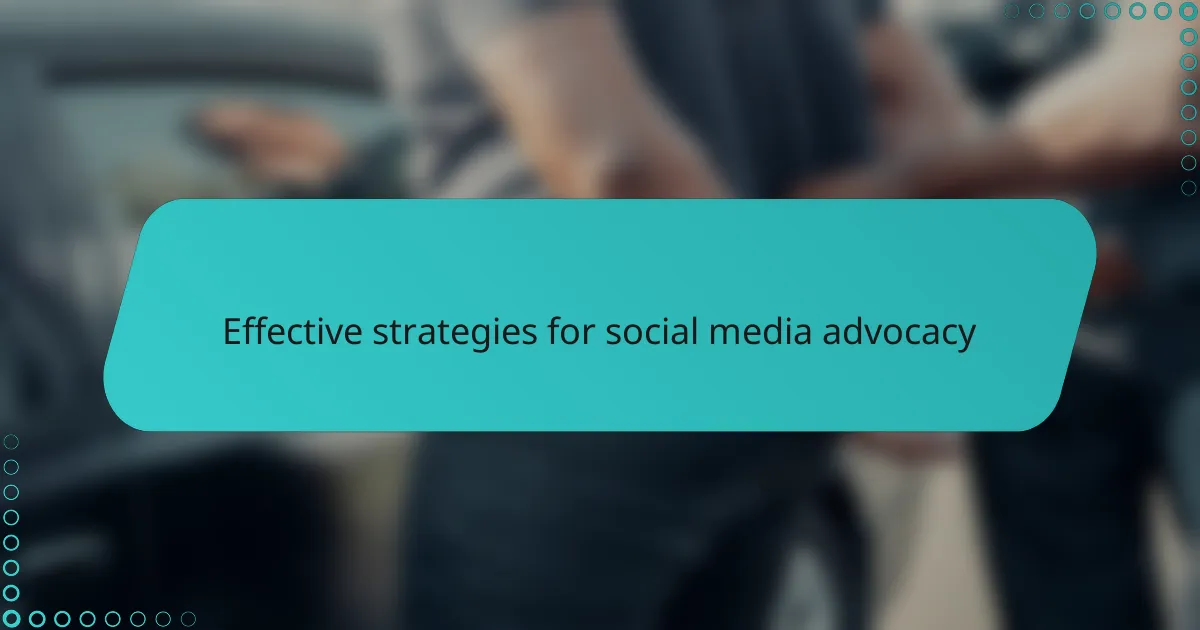
Effective strategies for social media advocacy
One strategy I’ve found effective is crafting clear, concise messages that cut through the digital noise. When I focus on a single, compelling call to action, it feels like my voice carries farther—people respond more when they know exactly what to do or how to help. Have you ever noticed how a well-timed, straightforward post gets more engagement than something vague or overly complex?
Consistency is another critical piece. In my experience, advocates who regularly share updates, stories, and insights build trust and keep their community engaged over time. It’s like nurturing a conversation rather than shouting once and disappearing. This steady rhythm keeps the issue alive in people’s minds and magnifies its importance.
Lastly, I can’t stress enough the power of personal storytelling. Sharing authentic experiences, even my own, creates emotional connections that dry facts and legal jargon simply can’t achieve. Have you felt moved by a story that made a complex issue feel personal? That’s the kind of impact effective social media advocacy strives for—turning followers into passionate allies.
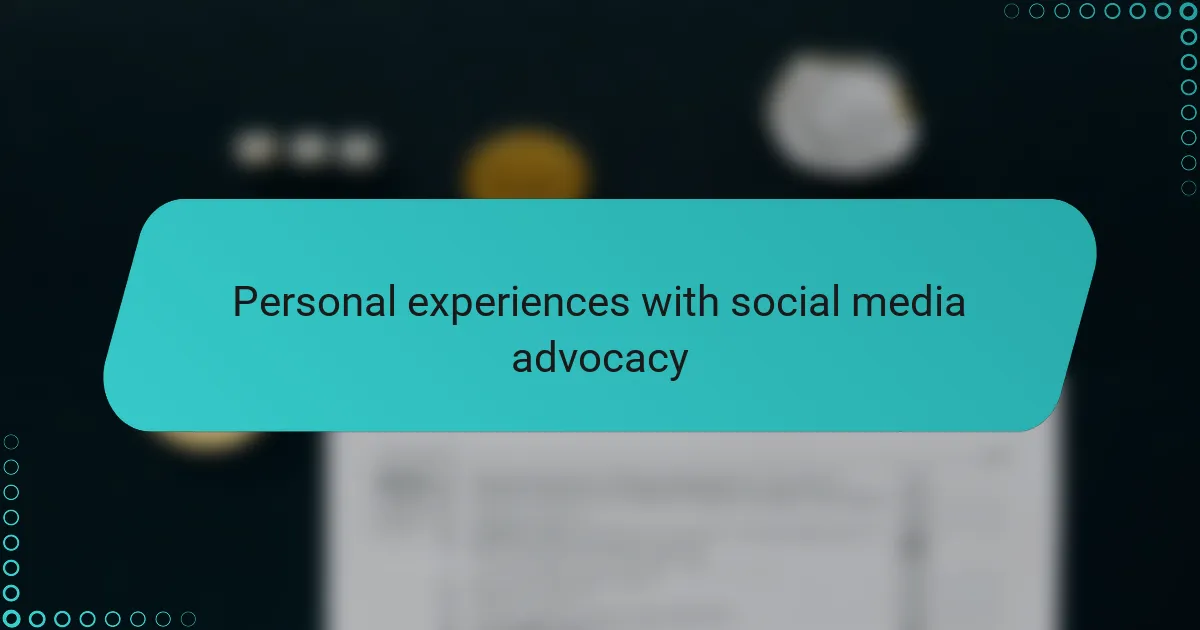
Personal experiences with social media advocacy
Using social media for legal advocacy has been a revealing journey for me. I recall one instance when sharing a personal story about a legal struggle sparked unexpected conversations and support from strangers—something that felt both empowering and humbling. Have you ever experienced how a single post can invite empathy and connect people who seem worlds apart?
At times, I found myself hesitant to share too much publicly, worried about privacy and misinterpretation. Yet, when I did open up, it often broke down barriers and made the legal issues more relatable, turning abstract laws into real human stories. Isn’t it remarkable how vulnerability online can actually strengthen a cause?
There was also a moment when a campaign I supported gained traction through a simple hashtag I helped create. Watching that grow made me realize that grassroots advocacy online isn’t just noise—it can truly move the needle. Do you think we sometimes underestimate the power we hold in our own hands with social media?
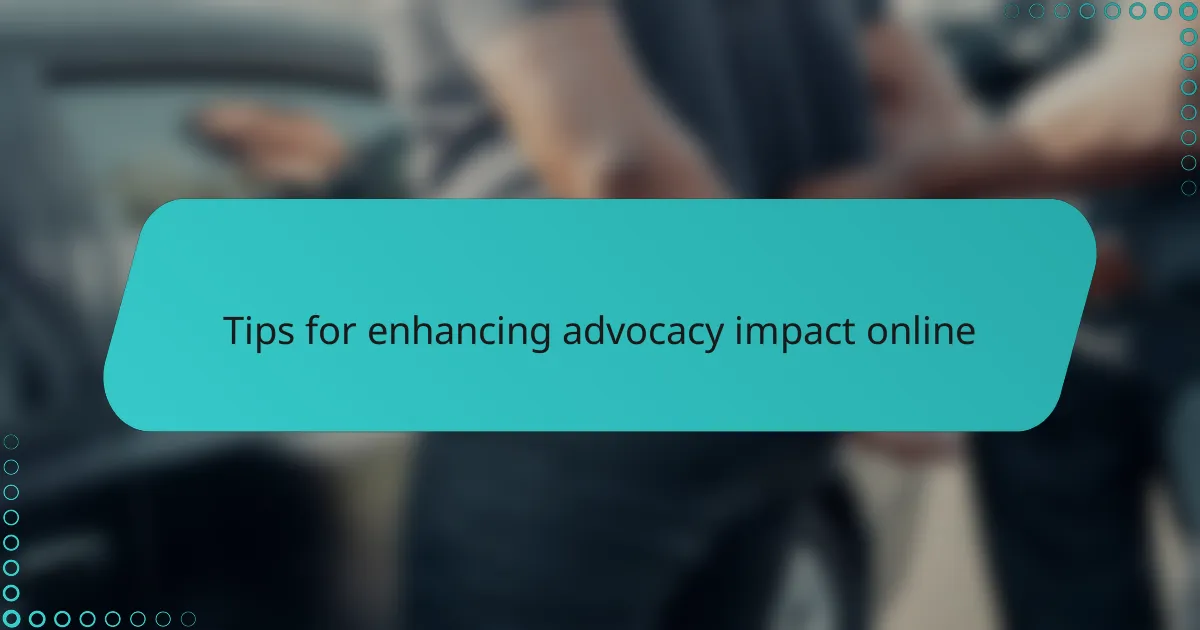
Tips for enhancing advocacy impact online
Consistency is something I’ve come to value deeply in online advocacy. Posting regularly—or even just showing up with updates—builds a sense of momentum and trust. Have you noticed how familiar voices tend to draw more attention over time? It’s like nurturing a garden; the more you tend it, the more it flourishes.
Another tip I swear by is using clear, focused messages. Early on, I found that posts drowning in jargon or multiple asks often fell flat. When I simplified my call to action, people seemed to respond with more enthusiasm. Isn’t it amazing how clarity can make your audience feel empowered rather than overwhelmed?
Finally, don’t underestimate the power of your personal story. Sharing real experiences adds heart to your advocacy, transforming abstract legal issues into something relatable. I remember a time when opening up about a difficult case not only sparked conversations but also created genuine connections. Have you ever felt that personal stories can move people to act in ways facts alone never could?
